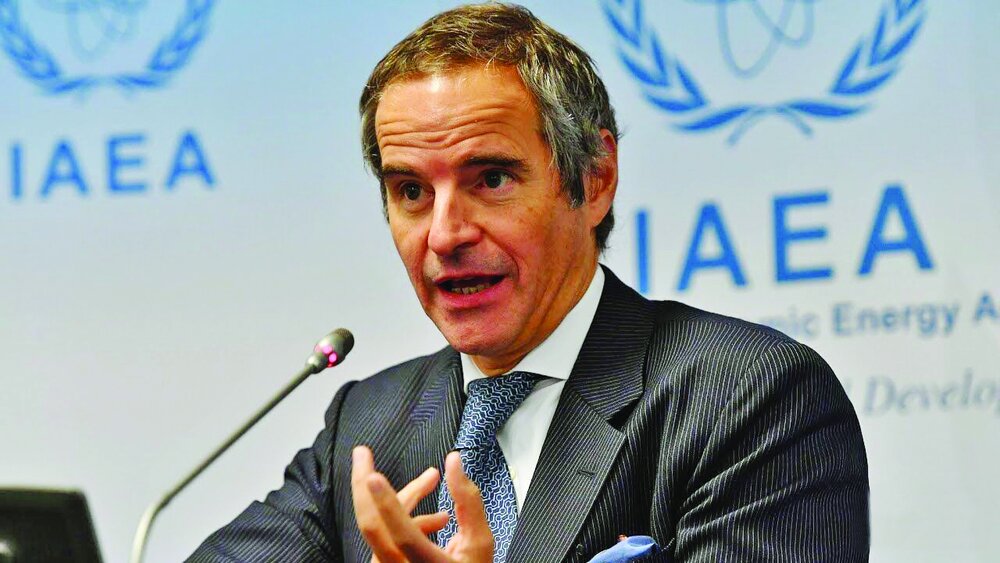Grossi: Paradoxical

TEHRAN — Speaking at the International Atomic Energy Agency Board of Governors meeting in Vienna on Wednesday, Rafael Grossi said the opposite of everything he said in Iran a day earlier.
Grossi, who visited Tehran late on Monday, went to meet with Mohammad Eslami, chief of the Atomic Energy Organization of Iran (AEOI), on Tuesday morning. On Wednesday afternoon, he held intensive talks with Hossein Amir Abdollahian, Iran’s Foreign Minister.
After their talks at the AEOI building, Grossi and Eslami talked to reporters in a joint press conference.
“The whole issue between Iran and the Agency (IAEA) is a technical one, and the Agency will not take into account or be influenced by the political issues and conspiracy theories of Iran's enemies about Iran's advancing nuclear program,” Eslami said.
He added, “Mr. Grossi repeatedly stated in today’s meeting that he has not seen any deviations in Iran's nuclear program, and Iran is pursuing its nuclear activities in accordance with treaties and regulations.”
Eslami also noted that Grossi’s questions about the documents provided to the IAEA by the Westerners as evidence were answered.
“The case of some of these documents has been closed and some cases remain, so we agreed to terminate [further discussions on] all the cases.”
The nuclear chief indicated that the important thing is that Iran is determined to continue its nuclear program. “Another important issue is that Iran is determined in its nuclear program. This issue is on our agenda and the International Atomic Energy Agency will help Iran in this regard.”
Grossi, on the other hand, said that he is looking to “deepen” dialogue with Iran.
“Couple of months ago, when I was here, we agreed with Dr. Eslami that we would be returning to continue in our joint work in clarifying a number of issues…, and also to continue and deepen our dialogue with the government of Iran,” the Argentinian diplomat noted.
During the press conference, Grossi also said, “He will have intensive talks, and hopes to end the day on a positive note.”
He added, “Our work has been intense in the course of morning, and we are continuing at this point our negotiations with a view to finding common ground. There are a number of issues that we are working and as the president (Eslami) just said it is very important that we put this in the perspective of the peaceful nuclear program of Iran at a time where climate change demands we work together, that we add clean nuclear energy to the matrices around the world, and as was discussed just a few days ago in Glasgow. So we will now multiply our efforts with a view to concluding our exchanges today in a positive note.”
In his interview with the Press TV while in Tehran, Grossi said he held “very constructive” talks with Iranian officials as part of “a long day of discussions, talks, and negotiations”. The IAEA chief also said, “The relation between the Agency and Iran is a permanent one…is a continuous one.”
However, a day later he gave a politically motivated and contradictory report to the IAEA Board of Governors.
The Board of Governors held a meeting on Wednesday afternoon to discuss Iran’s nuclear case. In his introductory statement, Grossi said that the negotiations in Tehran were “inconclusive.”
“I had extensive negotiations with senior Iranian officials to address Iran’s outstanding safeguards issues. As I will report, these negotiations proved inconclusive,” he said.
Grossi added, “In the absence of regular Agency access to its surveillance and monitoring equipment at all facilities and locations in Iran in relation to the JCPOA, the Agency considers the temporary agreement I reached with Iran in February 2021 facilitated the maintenance of continuity of knowledge. However, the repeated prolongation of the agreement, which has now been in place for around nine months, is becoming a significant challenge to the Agency’s ability to restore this continuity of knowledge.
In addition, contrary to the agreement reached between the Agency and Iran on 12 September 2021, the lack of access to the Karaj workshop has meant that the restoration of surveillance and monitoring at all of Iran’s facilities and locations in relation to the JCPOA could not be completed. This is seriously affecting the Agency’s ability to restore continuity of knowledge at the workshop, which has been widely recognized as essential in relation to a return to the JCPOA.”
He then reiterated the call upon Iran to take “immediate steps to remedy the situation, and to implement security procedures at nuclear facilities in a manner consistent with internationally accepted security practices and Iran’s legal obligations in relation to privileges and immunities of the Agency and its inspectors.”
What he said in Tehran and Vienna differ vastly. When asked about the contradiction between the two statements at a press conference after the board meeting on Wednesday, Grossi said there is no contradiction whatsoever.
“There is no contradiction. Talks in Tehran were constructive, correct, professional, but no agreements were made. Iran refused to agree with us,” he said.
The Argentinian diplomat is continuing it politicization of the Iran nuclear program. The IAEA seems to have forgotten that its role is to iron out the technical issues over the Iran nuclear program. Yet the paradoxical Grossi’s disinformation campaign comes as Iran, the U.S. and P4+1 are gathering in Vienna to discuss how they can remove the brutal sanctions imposed on Iran.
